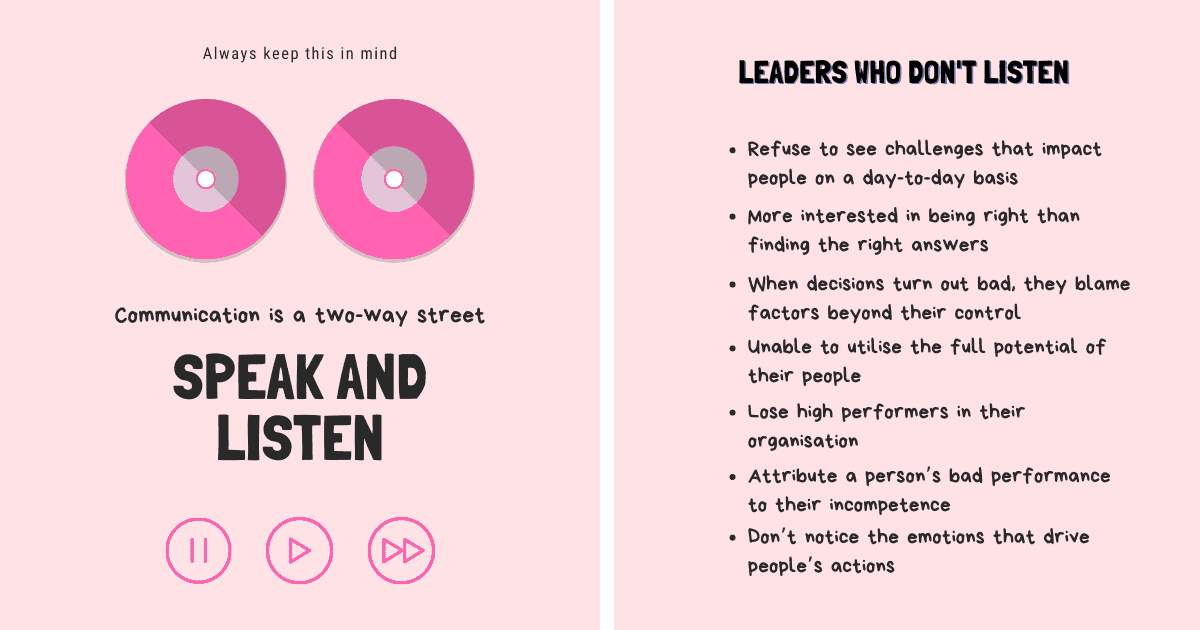As a leader, I have come to realize that success lies not only in the ability to make decisions and set goals, but also in the capacity to listen. Listening skills are often overlooked or undervalued in the realm of leadership, but they are crucial for creating an environment where teams can excel and reach new heights.
When I first started in my leadership position, I thought that being a good communicator meant being able to speak persuasively and convey my ideas effectively. While those aspects are important, I soon discovered that true communication involves much more than just talking. It involves active listening and genuinely hearing what others have to say.
Listening is not simply hearing the words being spoken; it is about fully understanding the underlying meaning and emotions behind those words. It is about making a genuine connection with the person speaking and letting them know that their thoughts and opinions matter. When a leader listens, they validate and empower their team members, creating a sense of trust and camaraderie.
One of the key benefits of honing listening skills as a leader is the ability to gather diverse perspectives and ideas. Every individual on a team has unique experiences, knowledge, and insights to bring to the table. By actively listening to each team member, I have been able to tap into their expertise and harness their talents to find innovative solutions to challenges. This not only enhances the quality of decision-making but also fosters a culture of collaboration and inclusion.
Moreover, listening promotes employee engagement and motivation. When team members feel heard and valued, they are more likely to feel invested in the success of the organization. By giving them a voice and really listening to their ideas, concerns, and feedback, I have noticed a significant increase in their sense of ownership and commitment. They become more willing to go the extra mile, strive for excellence, and take ownership of their work.
Listening skills also play a vital role in conflict resolution and problem-solving. Conflict is an inevitable part of any team dynamic, but it is how it is handled that determines whether it becomes destructive or constructive. When conflicts arise, I have learned to apply active listening techniques to allow all parties involved to express their thoughts and emotions openly. By truly hearing and understanding each perspective, a leader can find common ground and facilitate open dialogue, ultimately leading to a resolution that satisfies all parties involved.
In addition to fostering effective communication and teamwork, listening skills are instrumental in creating a positive work culture. Too often, employees feel invisible, unheard, and unappreciated. However, by genuinely listening to their concerns and ideas, a leader can create an environment where everyone feels valued and respected. This not only boosts morale and well-being but also leads to increased productivity and retention. People are more willing to work hard and stay committed when they feel a sense of belonging and purpose.
Enhancing listening skills does not happen overnight; it requires practice, reflection, and a genuine desire to improve. Here are a few strategies I have found helpful in developing my listening skills as a leader:
1. Be present: Prioritize being fully present when engaging in conversations with team members. Minimize distractions, maintain eye contact, and give your undivided attention.
2. Practice active listening: Instead of just waiting for your turn to speak, focus on understanding what the speaker is saying. Ask clarifying questions and paraphrase their points to ensure you have grasped their message accurately.
3. Create a safe space: Foster an atmosphere where everyone feels comfortable sharing their thoughts and opinions. Encourage open dialogue and assure your team members that their ideas will be heard and respected.
4. Seek feedback: Actively seek feedback from your team members on your listening skills and areas for improvement. Embrace constructive criticism and make appropriate adjustments.
5. Embrace empathy: Put yourself in the shoes of your team members and truly try to understand their perspectives. Empathy enables us to connect on a deeper level and fosters a culture of understanding and compassion.
In conclusion, listening skills are an essential tool for effective leadership. By actively listening and genuinely hearing those around us, we can inspire teams to excel, foster a culture of collaboration, and create an inclusive work environment. As leaders, let us embrace the power of listening and unlock the true potential of our teams.
